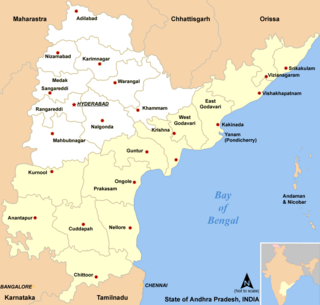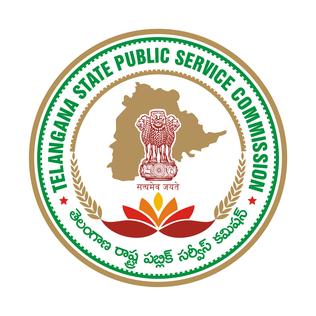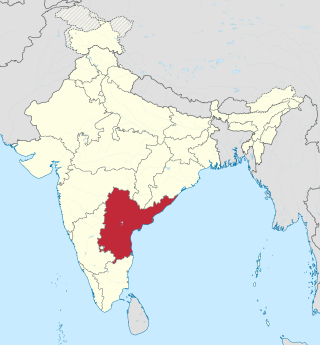The Other Backward Class (OBC) is a collective term used by the Government of India to classify communities that are "educationally or socially backward". It is one of several official classifications of the population of India, along with general castes, Scheduled Castes and Scheduled Tribes. The OBCs were found to comprise 52% of the country's population by the Mandal Commission report of 1980 and were determined to be 41% in 2006 when the National Sample Survey Organisation took place. There is substantial debate over the exact number of OBCs in India; it is generally estimated to be sizable, but many believe that it is higher than the figures quoted by either the Mandal Commission or the National Sample Survey.

The Telangana High Court is the High Court for the Indian state of Telangana. Founded by the 7th Nizam of Hyderabad Mir Osman Ali Khan, initially, it was set up as High Court of Hyderabad for the then princely state of Hyderabad Deccan and later renamed High Court of Andhra Pradesh, as it was set up on 5 November 1956 under the States Reorganisation Act, 1956. The Andhra Pradesh High Court was renamed as High Court of Judicature at Hyderabad in view of the bifurcation of Andhra Pradesh state.

Nizamabad district is a district located in the north-western region of the Indian state of Telangana. The city of Nizamabad is the district headquarters. The district share boundaries with Jagtial, Sircilla, Nirmal, Kamareddy districts and with Nanded district of the state boundary of Maharashtra.

Ranga Reddy district is a district in the Indian state of Telangana. The district headquarters is located at Kongara Kalan Village, Ibrahimpatnam Mandal,. The district was named after the former deputy chief minister of the United Andhra Pradesh, K. V. Ranga Reddy. The district shares boundaries with Nalgonda, Yadadri Bhuvanagiri, Hyderabad, Medchal–Malkajgiri, Nagarkurnool, Mahabubnagar, Sangareddy and Vikarabad districts.

Hanamkonda district, is a district in the Indian state of Telangana. The district headquarters are located at Hanamakonda. The district borders the districts of Jangaon, Karimnagar, Warangal, Bhupalpally and Siddipet.
Reservation is a system of affirmative action in India created during the British rule. Based on provisions in the Indian Constitution, it allows the Union Government and the States and Territories of India to set a percentage of reserved quotas or seats, in higher education admissions, employment, political bodies, etc., for "socially and economically backward citizens".

The government of India constituted a common tribunal on 10 April 1969 to adjudicate the river water utilization disputes among the river basin states of Krishna and Godavari rivers under the provisions of Interstate River Water Disputes Act – 1956. The common tribunal was headed by Sri RS Bachawat as its chairman with Sri DM Bhandari and Sri DM Sen as its members. Krishna River basin states Maharashtra, Karnataka and old Andhra Pradesh insisted on the quicker verdict as it had become more expedient for the construction of irrigation projects in Krishna basin. So the proceedings of Krishna Water Disputes Tribunal (KWDT) were taken up first separately and its final verdict was submitted to GoI on 27 May 1976.

The Gentlemen's agreement of Andhra Pradesh was signed between Telangana and Andhra leaders before the formation of the state of Andhra Pradesh of India on 20 February 1956. The agreement provided safeguards with the purpose of preventing discrimination against Telangana by the government of Andhra Pradesh. The violations of this agreement are cited as one of the reasons for formation of separate statehood for Telangana.
A municipal corporation is a type of local government in India which administers urban areas with a population of more than one million. The growing population and urbanization of various Indian cities highlighted the need for a type of local governing body that could provide services such as healthcare, education, housing and transport by collecting property taxes and administering grants from the state government.

The Telangana movement refers to a movement for the creation of a separate state, Telangana, from the pre-existing state of Andhra Pradesh in India. The new state corresponds to the Telugu-speaking portions of the erstwhile princely state of Hyderabad, which were merged with Andhra Pradesh in 1956, leading to the Mulki Agitations.

Srikrishna Committee on Telangana or the Committee for Consultations on the Situation in Andhra Pradesh (CCSAP) is a committee headed by Justice B. N. Srikrishna to look into the demand for separate statehood for Telangana or keep the State united in the present form, Andhra Pradesh. The committee was constituted by the Government of India on 3 February 2010 and submitted its report on 30 December 2010 to the Ministry of Home Affairs.

Samaikya Andhra Movement was a movement organized to keep the Indian state of Andhra Pradesh united, and to prevent the division of the state - separating the Telangana districts of the state into a separate Telangana state. The movement was supported by government employees, advocates in Coastal Andhra & Rayalaseema regions along with students from 14 universities, various occupational, caste & religious groups of Coastal Andhra & Rayalaseema regions. The last set of protests were triggered after the Congress Working Committee decision to divide the state came to an end after President of India gave nod to Telangana Bill which would make the latter to come into existence from 2 June 2014.

Nandamuri Taraka Rama Rao served as Chief Minister of United Andhra Pradesh for three terms, between 1983 and 1995. He was the first person to hold the office while not a member of the Indian National Congress, while representing the Telugu Desam Party (TDP), which he himself founded in 1982. Rama Rao's time in office saw his ousting in an August 1984 coup after 1½ years in office, while he was abroad in the US undergoing coronary heart surgery. He was removed by Thakur Ram Lal, the Governor of Andhra Pradesh, and replaced with Nadendla Bhaskara Rao, the finance minister. Having come back from surgery, Rama Rao regained his position through demonstrating his majority support from members of the Indian Legislative Assembly. He returned to office in September 1984.

The Pre-2004 Telangana protests refers to the movements and agitations related to the Telangana movement that took place before the year 2004. Andhra state and Telangana was merged to form Andhra Pradesh state on 1 November 1956 after providing safeguards to Telangana in the form of Gentlemen's agreement. Soon after the formation of Andhra Pradesh, people of Telangana expressed dissatisfaction over how the agreements and guarantees were implemented. Protests initially led by students later under the leadership of newly formed political party Telangana Praja Samithi, led by M. Chenna Reddy and Konda Lakshman Bapuji, a minister who resigned from the cabinet led by then Chief Minister Kasu Brahmananda Reddy, demanding the formation of a separate state of Telangana. More than three hundred people died in police firing. Under the Mulki rules in force at the time, anyone who had lived in Hyderabad for 15 years was considered a local, and was thus eligible for certain government posts. When the Supreme Court upheld the Mulki rules at the end of 1972, the Jai Andhra movement, with the aim of re-forming a separate state of Andhra, was started in Coastal Andhra and Rayalaseema regions.
The Andhra Pradesh Reorganisation Act of 2014, commonly known as the Telangana Act, is an Act of Indian Parliament that split the state of Andhra Pradesh into Telangana and the residuary Andhra Pradesh state, as an outcome of the Telangana movement. The Act defined the boundaries of the two states, determined how the assets and liabilities were to be divided, and laid out the status of Hyderabad as the permanent capital of new Telangana state and temporary capital of the Andhra Pradesh state.

The Telangana Public Service Commission (TGPSC) is a government body of the state of Telangana, India, established by the Constitution of India, to select applicants for various state government jobs through competitive examinations according to the merits of the applicants and the rules of reservation.

Andhra Pradesh, retrospectively referred to as United Andhra Pradesh, Undivided Andhra Pradesh, and Combined Andhra Pradesh, was a state in India formed by States Reorganisation Act, 1956 with Hyderabad as its capital and was reorganised by Andhra Pradesh Reorganisation Act, 2014. The state was made up of three distinct cultural regions of Telangana, Rayalaseema, and Coastal Andhra. Before the 1956 reorganisation, Telangana had been part of Hyderabad State, whereas Rayalaseema and Coastal Andhra had been part of Andhra State, formerly a part of Madras Presidency ruled by British India.










